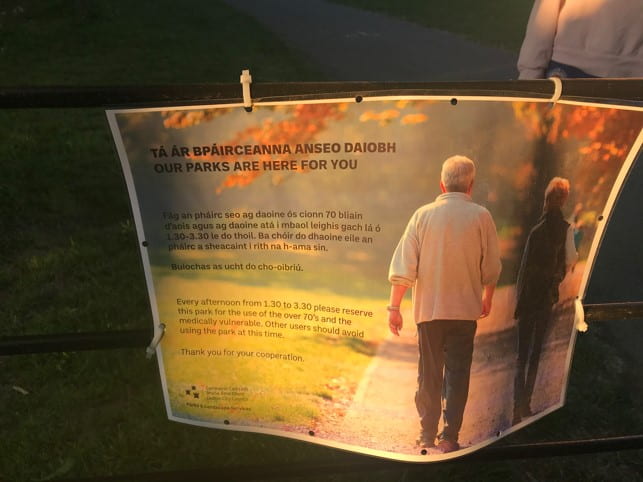Wild swimming during lockdown
By paulinegarvey, on 9 September 2020

A swimmer enjoying the water on the Dublin coast. Photo by Pauline Garvey
For some time, researchers have written about the possible benefits that come with wild swimming. This activity has been growing for some time, according to John Leech, chief executive of Irish Water Safety[i], who said his organisation has witnessed a “huge increase” in the number of people delving into open water swimming in the last decade. The benefits of open-water swimming are manifold, he suggests, and he particularly emphasises the benefits to mental health.[ii]
However, although swimming has been a popular activity along Dublin’s coastline for some time, this summer – during the Covid-19 lockdown months – it seems like it has spread in numbers and enthusiasm. With warm evenings throughout this summer, ever-larger groups of people of all ages could be spotted in bathing shelters and beaches, or along rivers. Bathing shelters along the coast were hives of activity and individuals who had never been in the habit of swimming before have taken to the water. Parents of primary school children who were on lockdown and distanced from friends were meeting up at popular bathing spots and socialising through swimming. Other sports enthusiasts took to the water too, particularly those whose activities had suspended during the lockdown. But it was not just about health: seaside parties started to spring up on the water’s edge, particularly after pubs and restaurants were locked down. ‘Outdoor swimming’ fell under the Government of Ireland’s Roadmap to reopening society on 18th May 2020, and more than ever, the Dublin coastline was a hive of activity. WhatsApp was integral in organising and coordinating these events, and men and women, parents and children and different age groups could meet in socially distanced ways.
Geographer Ronan Foley has carried out research on sea swimming along the Dublin coast, as well as inland spaces. His research was focussed not only in the activities but in the blue spaces where swimming takes place and he discovered that swimming places are significant in ‘building up personal and communal resilience and emerge as important public health assets’. Not only are they important for personal histories and identity, but they are an ingredient in creating spaces for communities of shared care and physical activity especially for older people or people with differences”[iii].
One striking feature of all this is the number of people who have taken to swimming for the first time. One 60-year-woman who had never swum in the sea on a regular basis before not only embraced the sea but wrote into a national newspaper in July stating:
‘…as a confirmed scaredy-cat when it comes to water, I took the plunge during lockdown. What an amazing new experience. […] …a surprising positive experience during this pandemic’.
Now, she calculates the tide times around her Zoom calls. [iv] She is not alone. A local 67-year-old politician made national headlines diving into the sea along the north coast of Dublin, prompting the deputy prime minister Leo Varadkar (Tanaiste) to tweet about his ‘beach bod’, while members of the public commented on his great shape and one person wryly noted that it fits well with the government’s plans to raise the pension age. These items, which appeared in newspapers and social media, swiftly circulated on countless WhatsApp groups both in the local area but also amongst groups that were set up to encourage people to meet safely outdoors, and swimming was one go-to.
These findings have particular relevance for older people in Ireland. A 2018 paper published by Economic and Social Research Institute (ESRI) argues that proximity to the sea had an impact on depression scores for older people. Linking the research with data from the Irish Longitudinal Study on Ageing (TILDA) they found that those with sea views were found to have a “significantly” lower risk of depression[v]. But besides the views, and the activity, is there more to this new interest that is associated with the lockdown? Foley makes an additional point about the water’s edge. These places are ‘are public, open, free and shared, where people of all generations, shapes, sizes and capabilities all meet up in ways they might rarely do otherwise’[vi]. Health and wellbeing might differ but the swimming might well outlast this lockdown.
References
[i] https://www.irishtimes.com/life-and-style/the-addictive-magic-of-swimming-in-the-sea-in-winter-it-s-life-affirming-1.4074180
[ii] Kelleher, Patrick 23/11/2019 The addictive magic of swimming in the sea in winter: ‘It’s life affirming’. The Irish Times
[iii] Foley, Ronan 30/12/19 The joys of outdoor swimming, RTE Brainstorm, https://www.rte.ie/brainstorm/2019/0102/1019936-into-the-blue-space-the-joys-of-outdoor-swimming/
[iv] Making a Splash, letter submitted to the Irish Times 25/7/20
[v] See Foley
https://www.irishtimes.com/news/health/older-people-with-sea-views-may-have-significantly-lower-risk-of-depression-1.3726672
[vi] Foley, Ronan 30/12/19 The joys of outdoor swimming, RTE Brainstorm, https://www.rte.ie/brainstorm/2019/0102/1019936-into-the-blue-space-the-joys-of-outdoor-swimming/
 Close
Close





